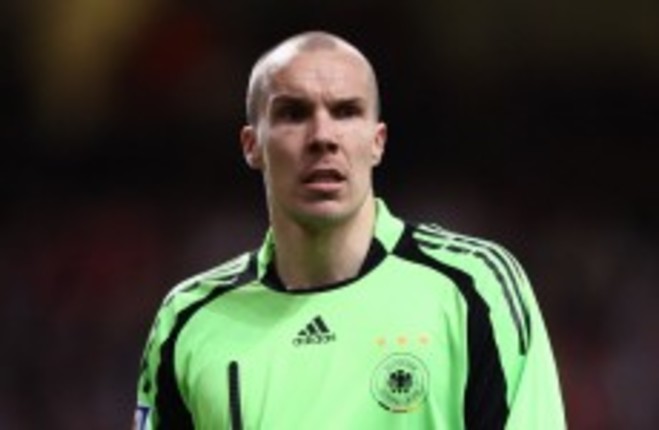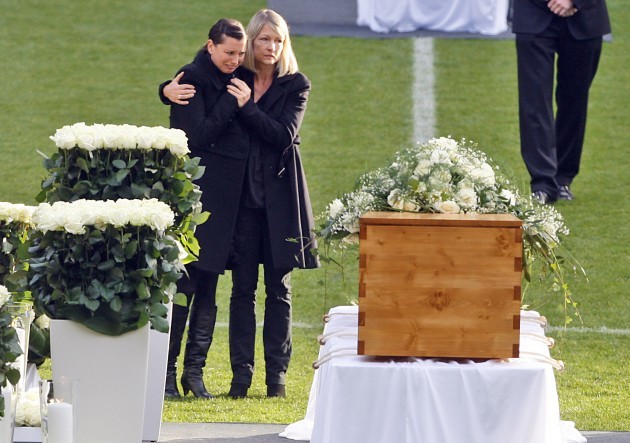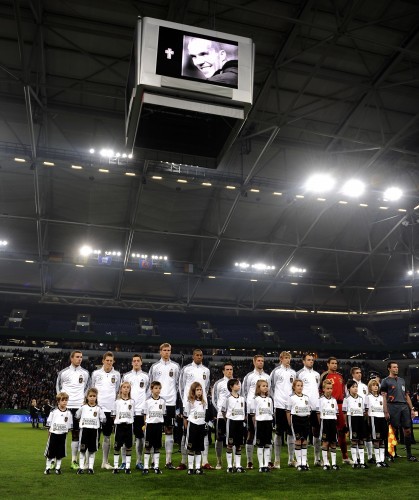FIVE YEARS AFTER German international Robert Enke’s suicide, his widow says attitudes towards depression have softened in Germany, but national football chief Wolfgang Niersbach insists little has changed.
Enke, who was Germany’s first-choice goalkeeper at the time, took his own life on 10 November 2009 by throwing himself under a commuter train after a six-year battle with depression.
He was just 32 and it later emerged he had kept his illness secret, partly through fear of losing custody of the daughter he had adopted with his wife.
Following the tragedy, the Robert Enke Foundation was established by his former club Hanover 96, the German Football Association (DFB) and the German Football League (DFL).
Part of its work involves offering advice and help to those suffering from mental illness, especially sportsmen and women.
An exhibition “Robert Enke — our friend and goalkeeper” opened last Friday in Hanover showing off memorabilia from a playing career which also included stints at Moenchengladbach, Benfica, Barcelona, Fenerbahce and Tenerife.
Enke lined out for for Barcelona, Benfica and Fenerbahce during his career while at the time of his death he played for Hanover 96 and had made over 150 appearances for the Bundesliga club. He also won eight caps for his country.
His life story was the subject of Ronald Reng’s brilliant and move biography ‘A Life Too Short: The Tragedy of Robert Enke’. The book won the William Hill Sports Book of the Year award in 2011.
His widow Teresa Enke says the foundation’s work is making a difference and public opinions towards psychological illness has changed since her husband’s suicide.
“Many things have been achieved (by the foundation), such as an advice service. This is a huge step forward, Robert and I were often alone and out on a limb,” said Teresa.
“Depression is something which is spoken about far more openly now and those affected are more able to ask for and receive help and treatment.”
One example is Hanover 96′s reserve goalkeeper Markus Miller who took two months away from playing in 2011 to be treated for depression and was given full support by Enke’s former club.
But the 32-year-old says he has experienced little sympathy towards his illness.
“Anyone who falls down to the left or right isn’t really currently a concern in our society,” said Miller in an ARD interview.
Just five days after Germany won the World Cup this year, goalkeeper Andreas Biermann, who had played for second division sides Union Berlin and St Pauli, committed suicide at the age of 34.
Biermann had announced he was suffering from depression in November 2009, in the immediate wake of Enke’s suicide, but later said he regretted going public.
“The fears I had, before I went public with my illness, were confirmed,” he told magazine Stern two years before his death.
“I wouldn’t recommend any professional footballer suffering from depression to go public with their illness.”
Niersbach says little has altered in terms of attitudes on the terraces of Germany’s top-flight football, but it is something the DFB are working on.
“It hasn’t seriously changed anything, we keep coming back to the point where we are still some way from a healthy sporting rivalry,” DFB president Niersbach told broadcaster ARD.
“We live through these things and set a code of conduct, but ultimately there are 80,000 spectators in the stadium and everyone follows their own interpretation of these standards.
“This has always been the case and will always remain so. But fairness must not be a concept just gathering dust in our society and in sport.
“It’s something we are committed to at the head of the association.”
Helplines
-
Samaritans 116 123 or email jo@samaritans.org
-
Console 1800 247 247 – (suicide prevention, self-harm, bereavement)
-
Aware 1890 303 302 (depression anxiety)
-
Pieta House 01 601 0000 or email mary@pieta.ie - (suicide, self-harm, bereavement)
-
Teen-Line Ireland 1800 833 634 (for ages 13 to 19)
-
Childline 1800 66 66 66 (for under 18s)



